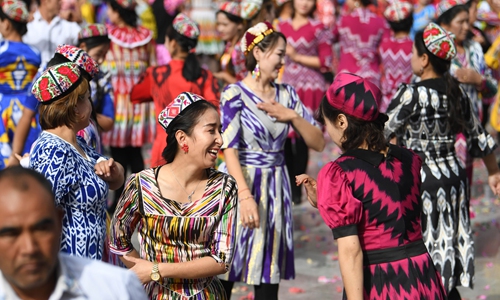HOME >> CHINA
Irish Times report smears China through fabricated news about Xinjiang
Source:Global Times Published: 2020/1/3 16:38:40 Last Updated: 2020/1/3 22:53:00

People dance at a square during a culture and tourism festival themed on Dolan and Qiuci culture in Awat County of Aksu Prefecture, northwest China's Xinjiang Uygur Autonomous region, Oct. 25, 2019. Photo:Xinhua
An Irish media outlet has published a report attacking China's policies in its northwestern Xinjiang Uygur Autonomous Region. However, its attack is based on fabricated content, the Xinjiang regional government said on Friday.
The Information Office of the People's Government of the Xinjiang Uygur Autonomous Region held a press conference on Friday to clarify recent rumors from certain Western media.
The article, titled "Become family': China sends officials to stay with Xinjiang minorities," by Peter Goff, was published on December 17 by the Irish Times. It alleges China's ethnic policy in Xinjiang is to "monitor and indoctrinate the Muslim community."
The article describes Xinjiang officials as "troublemakers" and "colonial invaders."
Goff told stories that have long been disproved, including that Han visitors force Uygur people to consume alcohol, cigarettes and pork.
Goff alleged that Han men rape women whose husbands or fathers are in so-called prison camps.
No good person could slander Xinjiang's "becoming family" policy, which has shortened the distance between different ethnic groups, said Parhati Rouzi, a senior Xinjiang official, refuting the Irish Times report.
No good person would fabricate lies such as China "demands Muslims drink alcohol, smoke cigarettes and eat pork," or that "ethnic Han men sleep in the same room as local women," the official said.
"I would like to ask reporters from the Irish Times who have been fabricating news: Where in Xinjiang did you find Muslims who are forced to eat pork and sleep with the men they are paired with?"
According to Parhati, Xinjiang began the pairing activity to enhance ethnic unity in 2016. Since then, 1.1 million officials of different ethnic groups have been paired with 1.6 million Uygurs. They respect and help each other.
The officials and employees who participated in the pairing activity have donated 940 million yuan ($134.85 million) in total. They helped their paired partners with medical care, education and employment.
However, certain Western reporters turn a blind eye to the facts, Parhati said.
Goff was invited in August 2019 to report on the core region of the Silk Road Economic Belt in Kashi, according to Parhati. In December 2019 he travelled to Kashi again.
"Peter Goff neglected the facts of his interview, but fabricated interviewees and content to create a false report which severely violated the professional integrity of journalists. He has no professional ethics," Parhati said.
"For his interview in Kashi, I arranged employees from our external affairs department to accompany him, and Goff did not interview the Imam and Uygur residents he mentioned in his report," Parhati said. "The actual interviewee, who graduated from a vocational education and training center, did not say what Goff wrote in his report."
"His report is totally fabricated. Our colleagues who accompanied him can confront him at any time."
This is not the first time Western media have tried to slander the counter-terrorism and de-radicalization efforts in Xinjiang.
The New York Times and CNN have been fabricating content about Xinjiang to cater to their own anti-China propaganda. But they turn a blind eye to the facts and clarification from the Xinjiang regional government, which shows the double standards of Western society, observers said.
Chinese Foreign Ministry spokesperson Geng Shuang said on November 26 that some Western media have been enthusiastically creating rumors about Xinjiang, and that certain politicians in some countries have been taking pleasure in accusing China in the fake news. This practice clearly shows their double standards on counter-terrorism and de-radicalization issues, and how vicious their intentions are when it comes to using Xinjiang-related issues to interfere in China's internal affairs.
Global Times
Newspaper headline: Irish report ‘fabrication’ of Xinjiang policy
Posted in: SOCIETY